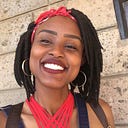“Where Are You From?” Is a Truly Outdated Question. Here’s What to Ask Instead
Home is where the heart is; my adventurous spirit means that each room in that home has a different geography.
I am fortunate enough to like to travel and also to live in several places. When I was born, I came into the world in one country but was soon raised in another, making me a third-culture kid. When people ask me “So, where are you from?” I’m not quite sure how to answer. What does it really mean to be ‘from’ anywhere, especially when as an individual person you identify with disparate places?
The form of that question that I find most disheartening is the version where the person asking wants a certain answer. They either follow up with “Where are you from-from?” as if saying the word ‘from’ twice will change the truth in my first answer. I am from the place that I just said. Rather than invalidate someone’s identity and culture, if you know you want a different answer, you need to ask a different question:
You can ask me where I grew up if you’d like to know where you could have found me as a child.
You can ask me where I live if you’d like to know where you can find me now.
You can ask me where I call home if you’d like to know what parts of the globe I identify with.
You can ask me my ethnic background if that’s what you actually want to know.
Although they can overlap, my ethnicity is not where I am from.
Although they can overlap, my childhood hometown is not where I am from.
Although they can overlap, my current address is not where I am from.
Understand the right place and the right time to ask the right question. Thanks to all our advancements in technology, we can be in any place in relatively no time. We’re living in a global economy with an abundance of methods for transporting ourselves and our lives to new locales. Accordingly, I’ve learned to condense my entire life into two check bags, one carry-on, and a personal item. I may not be “from” any of the places you think that I should be but they’ve all influenced who I am today. Home is where the heart is; my adventurous spirit means that each room in that home has a different geography.
In college, a person I had been friends with for approximately a year was telling me about how her accent gets in the way because of the assumptions people make about her Jamaican heritage. I told her I hadn’t noticed the accent nor had I previously pondered what country she might be from since it hadn’t come up in conversation until that point. She was really confused because she is used to her ethnicity being one of the first things people hone in on. Months into the friendship, I was just starting to become aware of it because I had been occupied with getting to know her story, rather than getting to know her labels.
Nevertheless, I relate with her experience. I’ve been stopped by strangers at the store, in public, in private, outdoors, and indoors; just minding my own business when someone that I don’t know steps into my flow because they want to know where I’m ‘from.’
They try to wrap it in compliments about my bone structure or height but objectification with a bow on top is still objectification.
Upon first encounter, you can learn a lot more about a human being when you don’t try to place facial features to a certain geography. People are not collectibles on shelves with a feature set checklist that you have to run through. Understand that what someone looks like is not where they are from and where they are from is not who they are, though it can influence it. Beyond that, who they are now is not the limit of who they can be.
Don’t judge a book by its cover is so cliché but I believe clichés become so because of the fact that they hold some truth. When I think back on it, the popular 2000s Internet chat message of “asl” to solicit age, sex, location is probably the worst way to approach someone. In this analogy, I would compare it to the use of high-level labels to assign an entirely new book a table of contents based on other books’ tables of content. Then on top of that, using your preconfigured outline to decide if the book is worth reading. But:
Everyone has a story in them that is worth telling.
It is limiting to let preconceived notions from our limited experience fill in another person’s story. You won’t experience the privilege of getting to that story if you rely on arbitrary markers to define what you think that story is.
If you’d like to dive deeper into watching stories unfold without labels leading the conversation, you can watch the shows that have changed my approach to people: the Circle, Love is Blind, and This is Us. Those series’ showed me what it means to break down boxes to build up bonds; coming at the world as if every new person is a mystery flavor regardless of what you think the packaging might tell you. Some of my longest friendships came about with people who I seem to have nothing in common with; but that’s at a surface level.
Do your best to live out Martin Luther King Junior’s dream and judge people not by the color of their skin (or any external detail for that matter) but by the content of their character. That is what we need as a society to progress into a more empathetic consciousness.
